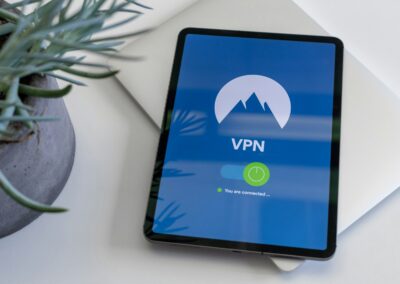Adapting Cybersecurity to Meet Evolving Business Needs
The Importance of Zero Trust Security Models
The scalability and flexibility of zero trust security models have become critical components of modern cybersecurity strategies. These models operate on the principle of “never trust, always verify,” ensuring that every access request is thoroughly vetted, regardless of its origin within or outside the organization’s network.
In regions like Saudi Arabia and the UAE, where technological advancements are driving economic growth, implementing zero trust security models is essential for safeguarding digital infrastructures. Cities such as Riyadh and Dubai, which are hubs of innovation, are leading the way in adopting these advanced security measures to protect their burgeoning digital economies.
Zero trust security models offer numerous advantages, including enhanced visibility, improved threat detection, and the ability to prevent lateral movement of attackers within a network. By enforcing strict access controls and continuously monitoring user activities, these models provide a robust defense against increasingly sophisticated cyber threats.
Scalability: Meeting Growing Demands
As businesses expand and their IT environments become more complex, the scalability of zero trust security models is paramount. Organizations must ensure that their security frameworks can accommodate growth without compromising performance or security. This requires a flexible architecture that can seamlessly integrate new users, devices, and applications.
In Saudi Arabia and the UAE, where rapid digital transformation is underway, scalability is a key consideration. Companies must implement zero trust solutions that can grow alongside their operations, supporting increased traffic and diverse user bases. This involves leveraging cloud-based security services, which offer the elasticity needed to handle varying workloads and peak usage periods.
Furthermore, the integration of AI and machine learning technologies can enhance the scalability of zero trust models. These technologies enable automated threat detection and response, reducing the burden on IT teams and ensuring that security measures keep pace with organizational growth. By continuously learning and adapting to new threats, AI-driven zero trust solutions provide a scalable and resilient security posture.
Flexibility: Adapting to Changing Business Needs
The flexibility of zero trust security models is equally important as scalability. Businesses must adapt to changing market conditions, emerging technologies, and evolving regulatory requirements. Zero trust models must be capable of adjusting to these dynamics without disrupting operations or compromising security.
In regions like Riyadh and Dubai, where innovation is a driving force, flexibility is a critical attribute. Organizations must be able to integrate new technologies, such as blockchain and the metaverse, into their security frameworks. Zero trust models that support API-driven integrations and modular components offer the flexibility needed to accommodate these advancements.
Additionally, flexible zero trust solutions can help businesses navigate regulatory landscapes. For example, organizations in Saudi Arabia and the UAE must comply with local data protection laws and international standards. A flexible zero trust model can easily incorporate compliance measures, ensuring that businesses remain in adherence to legal requirements while maintaining robust security.
Implementing and Managing Zero Trust Security Models
Strategic Planning and Execution
Effective implementation of zero trust security models requires careful planning and strategic execution. Business leaders must assess their current security posture, identify potential vulnerabilities, and develop a comprehensive zero trust strategy. This involves setting clear objectives, allocating resources, and establishing timelines for deployment.
In the context of Saudi Arabia and the UAE, where digital transformation is a national priority, organizations must align their zero trust initiatives with broader business goals. This ensures that security measures support growth and innovation rather than hindering them. Collaboration between IT and business units is essential for developing a cohesive strategy that addresses both security and operational needs.
Moreover, executive coaching services can play a pivotal role in guiding leaders through the implementation process. By providing expert advice and support, these services help executives make informed decisions, manage change effectively, and ensure the successful adoption of zero trust models.
Continuous Monitoring and Improvement
Once implemented, zero trust security models require continuous monitoring and improvement to remain effective. This involves regular assessments, audits, and updates to address emerging threats and evolving business requirements. Continuous monitoring ensures that security measures are functioning as intended and that any anomalies are promptly addressed.
In regions like Riyadh and Dubai, where the threat landscape is constantly changing, businesses must stay vigilant. Implementing advanced monitoring tools, such as Security Information and Event Management (SIEM) systems, can provide real-time insights into network activities and potential threats. These tools, enhanced by AI and machine learning, enable proactive threat detection and response.
Additionally, fostering a culture of continuous improvement is crucial. This involves training employees, conducting regular security drills, and encouraging collaboration among cybersecurity teams. By promoting a proactive security mindset, organizations can ensure that their zero trust models evolve alongside the threat landscape.
The Future of Zero Trust Security
As cyber threats become more sophisticated, the future of zero trust security models will be shaped by ongoing advancements in technology and evolving business needs. AI and machine learning will continue to enhance threat detection and response capabilities, making zero trust models more effective and efficient.
In Saudi Arabia and the UAE, where digital transformation is accelerating, zero trust security will play a pivotal role in protecting critical infrastructures and supporting economic growth. By embracing scalable and flexible zero trust models, businesses can secure their digital assets, maintain regulatory compliance, and drive innovation.
Ultimately, the successful implementation of zero trust security models requires a holistic approach that encompasses strategic planning, continuous monitoring, and a commitment to ongoing improvement. By adopting these principles, organizations can build resilient security frameworks that support their long-term success in an increasingly digital world.
#ZeroTrustSecurity #Cybersecurity #BusinessSuccess #LeadershipSkills #ProjectManagement #SaudiArabia #UAE #Riyadh #Dubai























